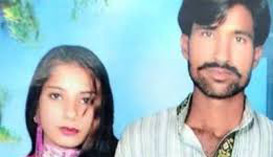
Pakistan: Anti-terrorism court indicts 106 suspects for burning Christian couple in Kot Radha Kishan
An Anti-Terrorism Court of Pakistan has charged 106 suspects with beating and burning a Christian couple in a brick kiln furnace in Kot Radha Kishan, last November.
They had been falsely accused of desecrating the Holy Quran.
The indictment of the 106 came after the police submitted a challan (charge-sheet) against the suspects at the anti-terrorist court in Lahore on May 22.
The challan states that Maulvi Mohammad Hussain, Maulvi Arshad Baloch and Maulvi Noorul Hassan were involved in persistent provocative speech against the couple which led to the assembly of 400 people, as a mob, who then burnt Shama and Shahzad Masih alive.
After the challan was presented at the hearing, the court also held Yousaf Gujjar, the owner of the brick kiln where the couple was beaten to death, responsible.
The enraged mob beat the Christian couple to death in November last year for allegedly desecrating a copy of the Holy Quran and burnt their bodies in the brick kiln where they worked.
The incident took place in the town of Kot Radha Kishan, some 60 kilometres southwest of Lahore.
The blasphemy law is widely being misused by individuals to settle personal vendettas.
Every year in Pakistan several innocent people are killed, churches are attacked, Christian towns and villages are set on fire simply after allegations of blasphemy are made.
CLAAS provides free legal aid to those who are charged under the blasphemy law and also campaigns to stop its misuse.
We have several examples, like in Rimsha Masih’s case where Imam Jadoon Chishti planted evidence and in 2005 Muhammad Saleem admitted that he had falsely accused Yousaf Masih of burning the Quran Mahal (Quran Palace).
After Yousaf was accused three churches were attacked and set on fire, a Christian library was burnt and a convent was attacked, but Saleem was never questioned.
This is the time for the courts deliver justice and punish those who provoked the mob to take the law into their own hands. The court must set an example to deter people from taking the law into their own hands in the future.
The Supreme Court has taken a suo motu notice of this case, and we are not aware of its present status.


